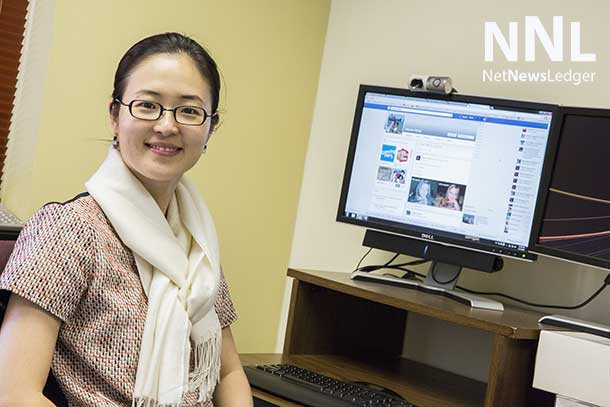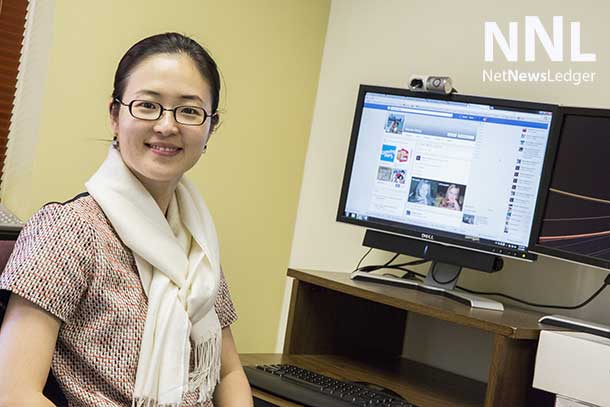
THUNDER BAY – TECHNOLOGY –There are over 70,000 people in the Thunder Bay Region on Facebook. Social media has become a huge part of the lives of hundreds of millions of people world-wide.
If you doubt that concept, simply watch people walking with a phone in one hand and often a coffee in the other. Or the number of people who can’t put down their phone.
In a few short years, the smartphone has become an extension of our lives, and our hands.
But is being connected 24/7/365 making people happier?
Are people becoming lonelier even as they feel more connected online?
Hayeon Song, an assistant professor of communication at UWM, explored this topic in recent research. Song’s study looked specifically at Facebook, which, with more than one billion users and growing, is a major force in people’s everyday life and social interactions.
The work of Song and her team, published this summer in “Computers in Human Behavior,” analyzed data from relevant existing studies to conclude that there is a relationship between Facebook use and loneliness. The researchers concluded that relationship exists because the feeling of loneliness brings its users to Facebook, rather than because Facebook makes people lonely.
The researchers chose to focus on Facebook because it is by far the most popular online social media site, with people using it to share personal information, meet people and develop friendships, according to the study. The use of Facebook – at home and at work – accounts for 54 percent of users’ time online globally and 62 percent of their time in the United States.
Whether the impact of all that “connectedness” is helping or harming human interactions is an ongoing topic in the media as well as in the scholarly community, Song says. For several decades, researchers have been looking at whether Internet use, in general, is psychologically beneficial or detrimental.
Basically, researchers have had two conflicting hypotheses about what they call the “Internet paradox,”
Song states, “Does spending so many hours with a machine keep people from making real connections with other people? Or, does it allow people who are shy or socially awkward a chance to connect with others in a way that’s more comfortable for them than face-to-face communication?”
For example, Song notes, when people communicate online they can reflect and think longer before saying something. This gives people a way to connect with others while feeling less anxiety.
While Internet use in general has been studied extensively, not as much research has been done on the relatively newer phenomenon of Facebook.
Song and her team collected and reviewed all the data published so far on the issue, searching electronic databases for the keyword “Facebook,” coupled with other search terms such as anxiety, shyness, loneliness.
“Some researchers found a ‘positive’ relationship between Facebook use and loneliness and some people found the opposite,” Song says.
Her team’s meta-analysis results, based on all the published studies, showed that there is a relationship between Facebook use and loneliness. That is, as loneliness increases, the time spent on Facebook increases. This means, at least, that Facebook does not help in reducing loneliness even if we feel more connected while using it,” added Song.
The research team also looked at the cause-and-effect relationship between loneliness and Facebook use. “Does Facebook make people lonely or are lonely people more attracted to Facebook,” is how Song puts it.
On this question, research studies offered a clearer answer. “We found that loneliness caused Facebook use rather than the other way around,” Song says.
Non-lonely people use Facebook, but they also maintain rich personal communications and relationships without it, according to Song. “Compared to non-lonely people, lonely people spend more time on Facebook. Lonely individuals who are shy or have low social support may turn to Facebook to compensate for their lack of social skills and/or social networks in face-to-face settings,” according to the study’ findings.
“The interesting point of this study is that it both supports and corrects the original Internet paradox study (The “Internet Paradox,” done by researchers at Carnegie Mellon University), which is one of the most influential studies in Internet research. To the question of whether or not the Internet increases psychological dysfunction such as loneliness, the Internet paradox study suggested that Internet use has detrimental effects. Our study supports this in that Internet use is associated with loneliness. However, we found the previously suggested causal direction to be erroneous: lonely people spend more time on the Internet rather than Internet use making people lonely,” Song concluded, adding more research on the subject is needed.
Future researchers, for example, may choose to look at different impacts at different points in people’s lives – do young people compensate for loneliness in the same way that older people do? Or do those who use Facebook compulsively respond differently than those who use it more casually?
One study that the researchers looked at, for example, indicated that Facebook use could become a vicious circle for those who feel alone and socially isolated – it allows them to reap the benefits of social interaction, but may make them feel more isolated as increased online contacts may replace real-life communication, Song says. “The rich get richer, and the poor get poorer,” as she put it.
With the data from only that one study, it’s hard to generalize, Song says. She adds that further study of the issues is important because loneliness is linked to psychological and health issues such as depression.
“Facebook is so widespread, and it’s evolving. For some people, it is almost like an addiction because they become so deeply involved, she says. “That’s why it’s important to understand the causes and the long-term consequences of using social media.”






